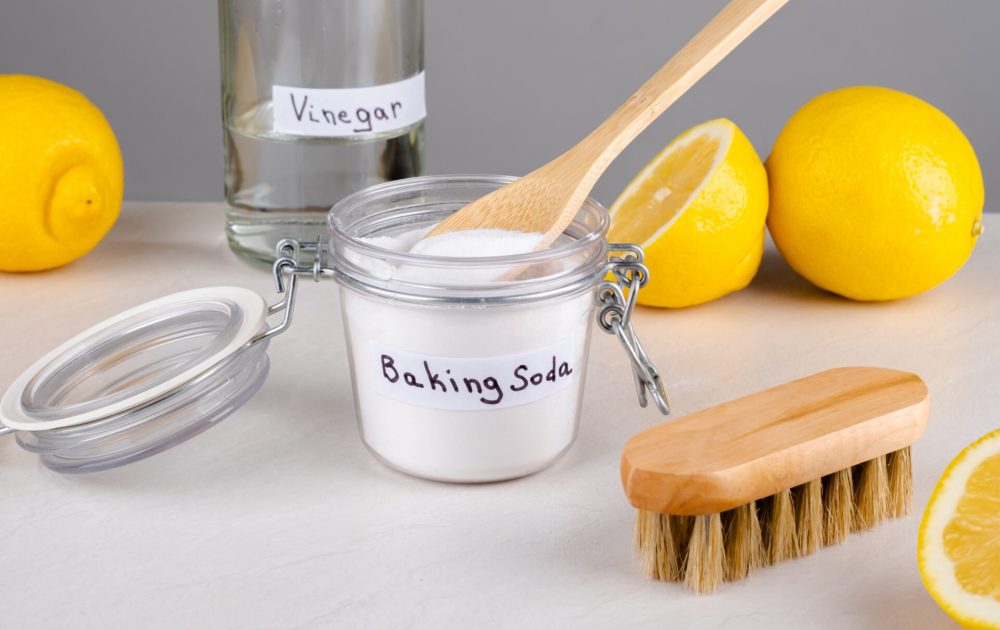Our test tells you which everyday chemicals you've recently come into contact with, and easy steps you can follow to reduce your exposure to them.
Chemical free spring clean

Spring is just around the corner so it’s a good time to blow away the winter cobwebs and give your home a good spring clean. But before you stock up on cleaning products, it’s worth taking stock of what’s in them, and whether some of their ingredients might pose a risk to our health.
With an abundance of chemical free alternatives there are lots of easy ways to get your home sparkling and clean without reaching for the bleach or products that rely on chemicals.
Are cleaning ingredients a problem for our health?
Many everyday products rely on chemical substances to enhance their performance including longer shelf life, cleaning efficiency, to add fragrance, and convenience of ready to use products. Many of these substances are known as endocrine disrupting chemicals (EDCs) because they interfere with the normal functions of the endocrine system. They can disrupt production and regulation of hormones within the endocrine glands, and change the body’s normal levels of hormones, and how its response to these changes. The World Health Organization estimate that of 150,000 chemicals in everyday use 800 may have endocrine disrupting properties that may be harming our health.
Thousands of everyday cleaning products rely on chemical substances such as parabens, triclosan, phthalates and artificial fragrances – you can smell some of them as you walk down any supermarket cleaning aisle. Exposure to chemical substances with endocrine disrupting properties are linked to a vast range of health issues including lower fertility, changes in foetal and childhood development, and the development of cancer. For these reasons they are best avoided.
Chemical free cleaning alternatives
It’s relatively easy to avoid endocrine disrupting chemicals when cleaning your home to reduce your exposure to synthetic chemicals when you are cleaning.
Here are some ideas to help get your spring clean started.
- For convenient, ready-to-use cleaning products, search for plant-based toxin free cleaners, and scent free where possible.
- Swap out kitchen sprays and cream cleansers with a mix of baking soda and water. Keep a container of it under the kitchen sink and mix it with water to form a paste when you’re ready to use. It can clean a wide range of household items and surfaces, and at a fraction of the cost of ready mixed products. It can be applied directly to surfaces such as sinks for stubborn stains, subject to the manufacture’s guidance.
- To reduce carpet odours or spills. Sprinkle baking soda and leave overnight and then vacuum. For more intense stains mix it with lemon juice and allow to dry. White vinegar can also be added but add this last as it will cause the mixture to fizz.
- Borax Substitute (boric acid) effectively removes stains and odours. Follow the manufactures’ guidance for dilution.
- Use plastic free sponges, scourers, and cloths such as wood, bamboo, and sisal.
- To remove streaks and stains mix white vinegar with water and apply using a misting spray. The scent of the vinegar may linger for a while, but it’s an efficient alternative to stain removers that rely heavily on chemicals.
- Try soapnuts for laundry and other cleaning jobs. The nuts grow on sapindus trees, part of the lychee tree family. You could even try growing your own soapnuts!
- To clean away indoor mould mix 100g of Borax Substitute to 1L of water. Apply by spraying or wiping with a clean cloth. Wear a face mask to reduce the chances of inhaling mould spores, especially if you suffer from a respiratory condition such as asthma. Wear protective gloves to reduce skin irritations.
- Avoid using bleach to treat indoor mould – it stains the mould but doesn’t kill it. Wiping mould with bleach aggravates it and forces the mould to release more spores to defend itself, making the problem worse.
- For cleaning and polishing wood use beeswax or a pure nut oil such as almond or walnut.
- Avoid aerosol furniture polish which disperses more particles into ambient air.
- Dishwasher rinse aid has been linked to inflammation of the gut lining. Fill the compartment with a mixture of water and lemon juice instead.
Read more
Learn more about endocrine disrupting chemicals.
Exposure to phthalates and female reproductive health: A literature review
The information on our website should not be used as an alternative to medical advice from your doctor or other professional healthcare provider. If you have any specific questions about any medical matter, you should consult your doctor or other professional healthcare provider. Lastinghealth.com is not responsible for the content of external websites. The inclusion of a link to a third-party website should not be understood as an endorsement.
Image credit: HalynaRom